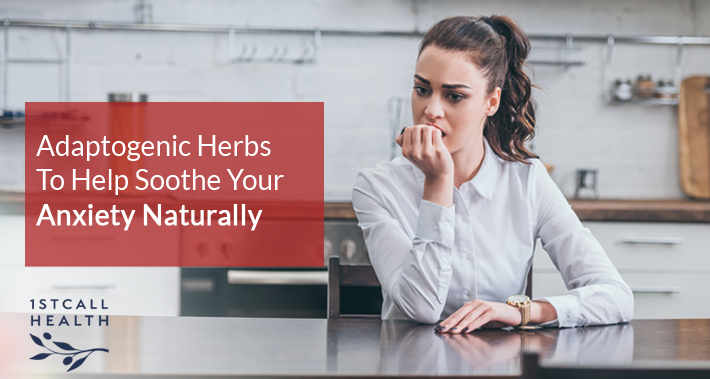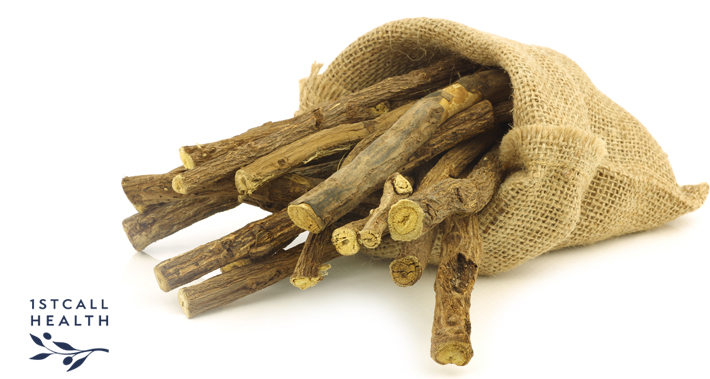
It’s common to feel anxious from time to time.
If you have a big exam or presentation tomorrow morning, for example.
But in that case, it’s situational.
You’re anxious about a specific thing.
And once that thing is over, your anxiety tends to go away with it.
But with an anxiety disorder, it’s different.
With an anxiety disorder, you may feel persistently anxious without any specific event to tie it to.
But what happens if you’re dealing with a prolonged stressful period?
Graduate school, a messy breakup, or career instability can make feelings of anxiety persist for long enough that it can feel like an anxiety disorder.
Here at 1stCallHealth, we’re a Washington DC virtual telemedicine medical clinic, and we can help.
As a medical clinic, we can offer medical solutions, like antidepressants.
But botanicals are also becoming an increasingly popular natural anxiety solution.
Some people use them alongside antidepressants to help manage particularly stressful periods.
If you’re curious to find out more about these and other solutions for anxiety management, we can help.
Book your appointment with 1stCallHealth today.
In the meantime, let’s take a closer look at some of these herbal solutions for anxiety, and how they can help.
What Does Chronic Anxiety Do To The Body?
Stress and anxiety are good things, in moderation.
They’re there to alert us to danger and get us to safety.
When you’re anxious, certain chemical reactions happen in your body.
Your cortisol raises, which increases your blood sugar, as well as the chemicals in your body that repair wounds.
Cortisol also reduces the parts of your body that are not immediately essential, like your digestive, immune, and reproductive systems, as well as higher brain functions.
These chemical reactions make sense when you consider humanity from an evolutionary perspective.
A million years ago, an anxiety response would have let us know to watch out for that nearby saber tooth tiger.
And if we were in danger, it would temporarily suppress things we didn’t immediately need, so we could get to safety.
We don’t need to worry about saber tooth tigers anymore, but our bodies don’t know that.
When you’re dealing with chronic anxiety, it can suppress your body’s vital functions on an ongoing basis.
And of course, that’s a problem.
How Do I Know If I Have Chronic Anxiety?
Chronic anxiety is a complex disorder.
If you’ve had it for long enough, it may even feel like it’s just your normal state.
But that doesn’t mean it isn’t still affecting you.
Chronic anxiety is an emotional and mental concern, but it can affect your physical health as well.
If you’re feeling the following symptoms, it may be related to a chronic anxiety disorder.
- Tachycardia (fast heartbeat)
- Feeling nervous or restless
- Tense muscles
- Digestive issues
- Difficulty focusing
- Difficulty remembering
- Chronic fatigue
- A sense of “impending doom”
- Hyperventilating
- Sweating or trembling
- Irritability or mood swings
- Chronic headaches or muscle aches
- Insomnia
- Restlessness
As well, people with chronic anxiety are more likely to:
- Have substance misuse issues
- Have difficulty maintaining relationships
- Have difficulty at school or work
- Be socially isolated
- Have chronic depression
Thankfully, there are natural solutions for chronic anxiety that can help.
What Are Adaptogenic Herbs?
Adaptogenic herbs are herbs that help manage stress in a particular way.
They do this by returning your body to a state of balance, called homeostasis.
Homeostasis is a level of balance between the various systems in your body.
Too much cortisol can cause anxiety, but so can too little cortisol.
Adaptogenic herbs help your cortisol levels return to a balanced state, which helps to manage chronic stress.
But the name “adaptogenic herb” is a bit of a misnomer, since it’s not just herbs.
Some adaptogens are derived from flowers, roots, leaves, stems, and even mushrooms.
But they can all help manage stress.
Below, we’ll take a look at some of the more common Adaptogenic herbs for chronic anxiety and stress.
These plants are considered to be safe and are well tolerated by most.
But it’s a good idea to speak to your medical care provider before adding something new to your health routine.
Everybody reacts differently to different medicines, even herbal ones.
So if you’re considering adding one of these adaptogenic herbs to your routine, book your appointment with 1stCallHealth first to make sure.
Without further ado, let’s look at three adaptogens in particular: licorice root, lavender, and holy basil.
1. Licorice Root
Did you read that name and immediately think of the long red rope candy you used to get for Halloween?
At one time, that stuff had licorice root in it, but these days it’s mostly artificial flavor.
But actual licorice root has been used for millennia, as far back as the ancient Egyptians.
It has a number of different health benefits, including managing gastrointestinal issues and helping produce healthy mucus.
But for our purposes today, it’s also a useful adaptogen.
Licorice root contains glycyrrhizic acid, a compound that stops your body from breaking down cortisol.
So if you have low levels of cortisol, licorice root can help them return to normal.
If you like the taste of licorice root, you can get this adaptogen as a tea.
If not, you can also take it as a tincture or a topical gel.
It’s not recommended to take licorice root if you:
- Have kidney disease
- Have high blood pressure
- Are pregnant
- Are breastfeeding

2. Lavender
Lavender is a light purple flower known for its soothing, relaxing scent.
You can find it in soaps and bath products as a result.
But it’s also got adaptogenic properties.
A 2010 study by Kasper Et Al found that a lavender oil extract helped reduce symptoms of restlessness, anxiety, and agitation in people with generalized anxiety disorder.
Another study, this one from 2015 by Karadag Et Al, found that lavender oil helped improve sleep and reduced anxiety in patients with heart disease.
It’s also great for easing headaches, which is a common symptom of chronic anxiety.
It’s easy to find lavender oil at most herbal dispensaries and drug stores.
If you’re using lavender oil though, be sure not to ingest it or use it topically.
3. Holy Basil
If you’re a fan of Italian cooking, you might be disappointed to learn that holy basil isn’t the stuff you love in your pasta sauce.
Holy basil, also known as tulsi, is an adaptogenic herb that can help manage stress.
And from a mental health perspective, it comes with a whole parade of benefits.
Various studies, including this 2011 study by Bhattacharyya Et Al, have found holy basil can:
- Reduce anxiety
- Reduce depression
- Reduce stress
- Manage sexual issues
- Manage insomnia
- Improve memory
- Decrease exhaustion
- Relieve symptoms of social isolation
You can get holy basil in loose leaf form to drink as a tea, or as a pill supplement if you don’t like the taste.
Book Your Appointment With 1stCallHealth Today
If you’re dealing with chronic anxiety, you don’t have to go through it alone.
Here at 1stCallHealth, we offer virtual and in person mental health medical services that can help.
Whether you’re interested in adaptogens, antidepressants, a combination approach, or something different altogether, we’re here for you.
We’ll take the time to work with you and find a solution that best meets your needs.
Book your appointment with 1stCallHealth today.
1stCallHEALTH
1331 H St NW Ste 200,
Washington, DC 20005
(202) 590-0009
– https://goo.gl/maps/MVhjkz2jqynWpsgo6
1stCallHEALTH provides affordable access to primary care services. We believe that everyone deserves affordable, high quality primary care. Our vision is to challenge the status quo, focus on the individual, and empower personal control to change the way we think about healthcare.




